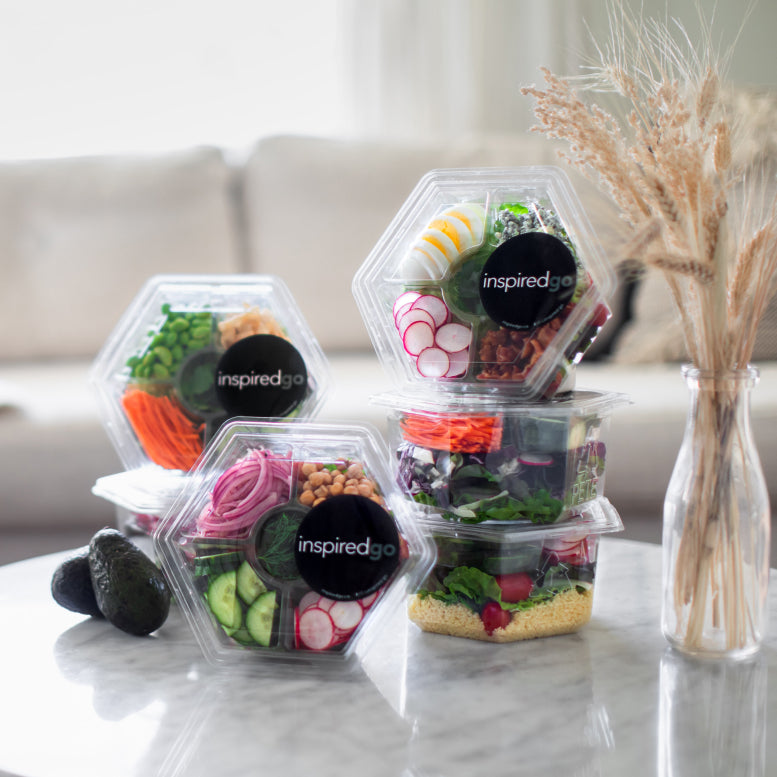Why Are Vegan Salads Recommended For Weight Management?
Table of Contents
1. The Impact of Vegan Salads on Weight Management
2. Are Vegan Salads Filling Enough for a Complete Meal?
3. Do Vegan Salads Provide Enough Energy for Busy Days?
4. Why Choose Inspired Go for Fresh Vegan Salads?
1. The Impact of Vegan Salads on Weight Management
Embracing a diet rich in plant-based meals, such as vegan salads, can play a significant role in weight management. Vegan salads are typically high in fiber and low in calories, making them a filling yet light dietary option. The fiber content not only aids digestion but also promotes a feeling of fullness, reducing the likelihood of overeating. Furthermore, these salads often incorporate a variety of vegetables, fruits, and whole grains, providing a wide range of essential nutrients. Plant-based proteins like lentils, chickpeas, and tofu can also be included for added satiety. By integrating vegan salads into regular meal plans, individuals can enjoy a delicious and diverse diet that supports a balanced approach to weight management.
Order fresh salads today →


2. Are Vegan Salads Filling Enough for a Complete Meal?
A common misconception is that vegan salads leave you hungry, but when designed thoughtfully, they can be as hearty and satisfying as any traditional meal. A well-structured vegan salad balances fiber-rich vegetables with plant-based proteins like chickpeas, tofu, or lentils, along with healthy fats from seeds, nuts, or olive oil-based dressings. These components work together to deliver sustained energy, reduce cravings, and keep you feeling full for hours without unnecessary heaviness. Whole grains or legumes included in some recipes add complex carbohydrates that further enhance satiety and provide a steady source of fuel throughout the day. The combination of fiber, protein, and healthy fats also helps stabilize blood sugar levels, preventing energy crashes. Choosing salads with nutrient-dense ingredients ensures you meet your calorie needs while supporting optimal digestion and overall vitality.
Choose your salads and schedule delivery →
3. Do Vegan Salads Provide Enough Energy for Busy Days?
Vegan salads, when built with a balanced mix of macronutrients, can offer steady, long-lasting energy to fuel even the most demanding schedules. Fresh vegetables deliver essential vitamins and minerals, while complex carbs from whole grains or legumes release energy gradually, avoiding the highs and crashes caused by refined carbs. Plant-based proteins like lentils, tofu, or beans support physical stamina and muscle recovery, making them ideal for active lifestyles. Healthy fats from avocado or olive oil aid in brain function, improving focus and concentration throughout the day. Adding nuts, seeds, or even roasted chickpeas to your salad can enhance satiety and help maintain energy levels without relying on heavy, processed foods. With thoughtful ingredient combinations, vegan salads provide the fuel you need to stay sharp and energized for hours.
Get fresh salads and snacks delivered →
4. Why Choose Inspired Go for Fresh Vegan Salads?
Inspired Go transforms plant-based eating into a seamless, enjoyable part of your routine by offering vegan salads that are as flavorful as they are nutritious. Our chefs combine premium, fresh vegetables with plant proteins, whole grains, and healthy fats to create balanced, complete meals you’ll actually look forward to eating. We focus on clean, high-quality ingredients free from unnecessary additives, ensuring every salad supports your health goals naturally. Delivered fresh and ready to eat, they make maintaining a plant-based lifestyle effortless, no matter how busy your schedule gets. With Inspired Go, you get consistent access to restaurant-quality vegan salads that taste amazing, fuel your body properly, and save you time every single day—helping you stay on track with your wellness goals without sacrificing flavor or convenience.
Try our fresh, ready-to-eat salads →
Frequently Asked Questions
The most nutritious salad greens are dark leafy varieties like spinach, kale, and arugula. These greens are packed with essential vitamins, including A, C, and K, as well as minerals like calcium and iron. Kale is particularly rich in antioxidants, while spinach offers significant amounts of folate and magnesium. Choosing a mix of dark greens enhances both the flavor and nutritional value of your salad.
A healthy salad includes a balance of nutrient-dense ingredients like leafy greens, fresh vegetables, lean proteins, and healthy fats. For example, a base of spinach and kale, paired with grilled chicken, cherry tomatoes, avocado, and a light olive oil dressing, creates a wholesome meal. Avoid fried toppings or sugary dressings, as they add empty calories, and opt for natural ingredients to maximize nutrition.
Yes, eating salad daily is a healthy habit when it includes a variety of fresh, nutrient-rich ingredients. Salads offer fiber for digestion, antioxidants for immunity, and essential nutrients like potassium and folate. Regularly eating salads can support weight management and improve energy levels. To avoid monotony, vary your greens, proteins, and toppings to keep meals satisfying and nutritionally balanced.
Healthy salad dressings are typically made with simple, natural ingredients. Olive oil-based dressings, paired with balsamic vinegar or fresh lemon juice, provide healthy fats and enhance flavor without unnecessary calories. Avoid store-bought dressings with high sugar or preservatives. For a creamy alternative, opt for homemade dressings using Greek yogurt or avocado for added nutritional benefits.
Yes, salads are incredibly beneficial for overall health when prepared with fresh, whole ingredients. They are low in calories and high in vitamins, minerals, and antioxidants, supporting heart health, digestion, and immunity. Adding a mix of proteins and healthy fats creates a satisfying, nutrient-dense meal. Regularly incorporating salads into your diet can promote long-term well-being and energy.

